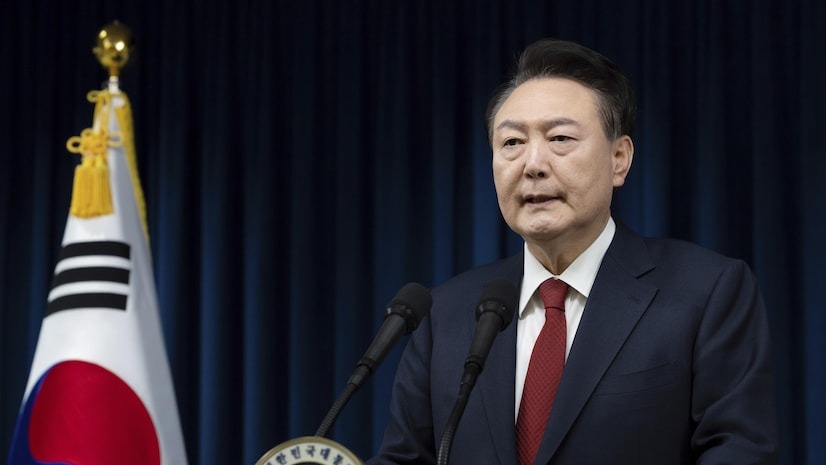Seoul: Hours after South Korea’s impeached President Yoon Suk Yeol was formally arrested, his supporters started rioting. His lawyers said that Yeol refused to answer questions about last month’s declaration of martial law.
Yoon was arrested early Sunday after being apprehended at his presidential compound in Seoul. He faces possible imprisonment for his failed attempt to impose martial law, which triggered the country’s most significant political crisis since democratization in the late 1980s.
The arrest led to unrest at the Seoul Western District Court, where dozens of Yoon’s supporters rioted, damaging the main door and windows. They used plastic chairs, metal beams and police shields taken from cops. Some threw objects, discharged fire extinguishers and damaged furniture, office equipment, and computer servers.
The protesters demanded to see the judge who issued the arrest warrant, but court officials said she had already left the building.
Police officers were deployed and nearly 90 protesters were arrested. Some injured police officers were seen being treated in ambulance vans. The court said it was trying to confirm whether any staff members were injured and assess the damage to its facilities.
The court describes Yoon as threatening to destroy evidence
In granting law enforcement’s request for an arrest warrant for Yoon, the court said he was a threat to destroy evidence. Saturday Yoon and his lawyers appeared before the court and argued for his release.
The Corruption Investigation Office for High-Ranking Officials, leading a joint investigation with police and the military, can now extend Yoon’s detention to 20 days, during which they will transfer the case to public prosecutors for indictment.
Investigators are examining whether Yoon’s December 3 martial law decree amounted to an attempted rebellion. While South Korean presidents have wide-ranging immunity from prosecution while in office, the protection does not extend to allegations of rebellion or treason.
Yoon’s lawyers could also petition to challenge the court’s arrest warrant. One of the president’s lawyers Yoon Kab-keun, said he will not attend a questioning by the anti-corruption agency set for Sunday afternoon and will remain at the detention center.
Yoon Suk Yeol’s appearance in court caused chaotic scenes in nearby streets, where thousands of his fervent supporters rallied for hours calling for his release. Even before the court issued the warrant for Yoon’s arrest, protesters repeatedly clashed with police. At least two vehicles carrying anti-corruption investigators were damaged as they left the court after arguing for Yoon’s arrest.
Yoon’s defence minister, police chief and several top military commanders have already been arrested and indicted for their roles in enforcing martial law.
Yoon’s lawyer decries his arrest
The crisis began when Yoon, in an attempt to break through legislative gridlock, imposed military rule and sent troops to the National Assembly and election offices. The standoff lasted only hours after lawmakers who managed to get through a blockade voted to lift the measure. The opposition-dominated assembly voted to impeach him December 14.
His political fate now lies with the Constitutional Court, which is deliberating whether to formally remove him from office or reinstate him.
Seok Dong-hyeon, another lawyer representing Yoon, called the court order for his arrest “the epitome of anti-constitutionalism and anti-rule of law.” He pointed to the riot and said Yoon’s arrest would inspire more anger from his supporters.
Yoon’s People Power Party regretted his arrest but also pleaded for his supporters to refrain from further violence
The liberal opposition Democratic Party, which drove the legislative effort to impeach Yoon, said his arrest would be a “cornerstone for restoring the collapsed constitutional order.” It also called for stern punishment of the rioters.
The country’s acting leader, Deputy Prime Minister Choi Sang-mok, expressed “strong regret” about the riot, saying it “directly undermines democracy and the rule of law.” He asked for heightened security at the sites related to Yoon’s case, also including the Constitutional Court, and measures to ensure order during protests.
Saturday when the investigators were attacked by protesters, the anti-corruption agency asked media companies to obscure the faces of its members attending the hearing.
Yoon insists his martial law decree was legitimate
Yoon and his lawyers have claimed that the martial law declaration was intended as a temporary and “peaceful” warning to the liberal opposition, which he accuses of obstructing his agenda with its legislative majority. Yoon says the troops sent to the National Election Commission offices were to investigate election fraud allegations, which remain unsubstantiated in South Korea.
Yoon has stressed he had no intention of stopping the functioning of the legislature. He stated that the troops were sent there to maintain order, not prevent lawmakers from entering and voting to lift martial law. He denied allegations that he ordered the arrests of key politicians and election officials.
Military commanders, however, have described a deliberate attempt to seize the legislature that was thwarted by hundreds of civilians and legislative staff who helped lawmakers enter the assembly, and by the troops’ reluctance or refusal to follow Yoon’s orders.
If prosecutors indict Yoon on rebellion and abuse of power charges, which are the allegations now being examined by investigators, they could keep him in custody for up to six months before trial.
If the first court convicts him and issues a prison term, Yoon would serve that sentence as the case possibly moves up to the Seoul High Court and Supreme Court. Under South Korean law, orchestrating a rebellion is punishable by life imprisonment or the death penalty.
PNN & Agencies
